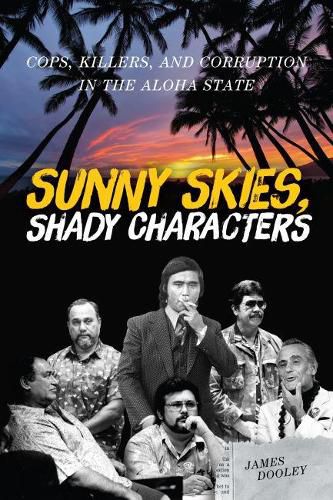Readings Newsletter
Become a Readings Member to make your shopping experience even easier.
Sign in or sign up for free!
You’re not far away from qualifying for FREE standard shipping within Australia
You’ve qualified for FREE standard shipping within Australia
The cart is loading…






For thirty years starting in the mid-1970s, the byline of Jim Dooley appeared on riveting investigative stories of organized crime and political corruption that headlined the front page of Honolulu’s morning daily. In Sunny Skies, Shady Characters, James Dooley revisits highlights of his career as a hard-hitting investigative reporter for the Honolulu Advertiser and, in later years, for KITV television and the online Hawaii Reporter. His lively backstories on how he chased these high-profile scandals make fascinating reading, while providing an insider’s look at the business of journalism and the craft of investigative reporting.
Dooley’s first assignment as an investigative journalist involved the city housing project of Kukui Plaza, which introduced him to the
pay to play
method of awarding government contracts to obliging consultants. In later stories, he scrutinized bloody struggles over illicit gambling revenue, the murder of a city prosecutor’s son, local syndicate ties to the Teamsters Union, and the dealings of Bishop Estate. His groundbreaking coverage of the forays by yakuza (Japanese organized crime) into Hawai'i and the continental United States were the first of its kind in American journalism.
As Dooley pursued stories from the underside of island society, names of respected public figures and those of violent criminals filled his notebook: entertainer Don Ho, U.S. Senator Daniel Inouye, Governors George Ariyoshi and Ben Cayetano, Mayor Frank Fasi, and notorious felons Henry Huihui, Nappy Pulawa, and Ronnie Ching. Woven throughout is the name of Big Island rancher Larry Mehau-was he the
godfather of organized crime
in Hawai'i as alleged by the FBI, or simply an ex-cop who befriended power brokers in the course of doing business for his security guard firm? The book includes a timeline of Mehau’s activities to allow readers to judge for themselves.
$9.00 standard shipping within Australia
FREE standard shipping within Australia for orders over $100.00
Express & International shipping calculated at checkout
For thirty years starting in the mid-1970s, the byline of Jim Dooley appeared on riveting investigative stories of organized crime and political corruption that headlined the front page of Honolulu’s morning daily. In Sunny Skies, Shady Characters, James Dooley revisits highlights of his career as a hard-hitting investigative reporter for the Honolulu Advertiser and, in later years, for KITV television and the online Hawaii Reporter. His lively backstories on how he chased these high-profile scandals make fascinating reading, while providing an insider’s look at the business of journalism and the craft of investigative reporting.
Dooley’s first assignment as an investigative journalist involved the city housing project of Kukui Plaza, which introduced him to the
pay to play
method of awarding government contracts to obliging consultants. In later stories, he scrutinized bloody struggles over illicit gambling revenue, the murder of a city prosecutor’s son, local syndicate ties to the Teamsters Union, and the dealings of Bishop Estate. His groundbreaking coverage of the forays by yakuza (Japanese organized crime) into Hawai'i and the continental United States were the first of its kind in American journalism.
As Dooley pursued stories from the underside of island society, names of respected public figures and those of violent criminals filled his notebook: entertainer Don Ho, U.S. Senator Daniel Inouye, Governors George Ariyoshi and Ben Cayetano, Mayor Frank Fasi, and notorious felons Henry Huihui, Nappy Pulawa, and Ronnie Ching. Woven throughout is the name of Big Island rancher Larry Mehau-was he the
godfather of organized crime
in Hawai'i as alleged by the FBI, or simply an ex-cop who befriended power brokers in the course of doing business for his security guard firm? The book includes a timeline of Mehau’s activities to allow readers to judge for themselves.